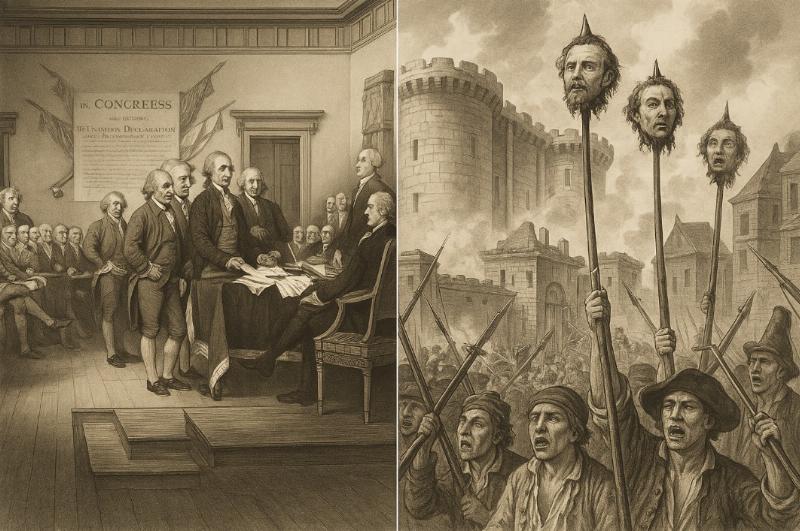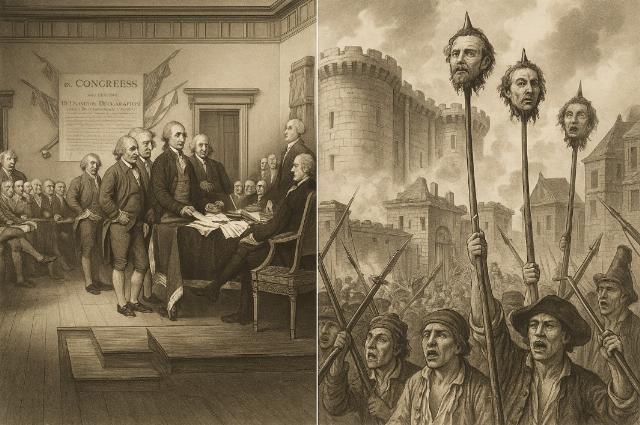


Today, July 14, is celebrated as Bastille Day in France. It should be a day of mourning across the rest of Western civilization.
Ten days after we celebrate July 4 as the symbol of the American Revolution, the pinnacle of the Enlightenment Era, the French celebrate Bastille Day on July 14 as the symbol of the French Revolution, an event that marked the end of the Enlightenment Era. These were the two titanic events of the 18th century, and all of world history since then can be analyzed as a competition to see which will win out, the Christianity and liberalism of the American Revolution or the atheism and socialism of the French Revolution.

Image by ChatGPT.
The Enlightenment (circa 1600-1800 A.D.) was a period of rationalism and reason—a search for objective truth in all aspects of life. In the Anglo world, it would lead to great advances in science, economics, and political theory.
In religion, the Enlightenment gave rise to Evangelical Christianity in the First Great Awakening, a religious revival and revolution in the American colonies and the UK. And that would in turn lead to the abolitionist movement that would, for the first time in history, abolish slavery as an accepted practice in the Western world.
In the United Kingdom, with its long history of individual rights existing side by side with Christianity, the Enlightenment led to classical liberalism. As John Locke wrote in his 2nd Treatise of Government, rights to life, liberty, and property were grounded in Judaism and Christianity.
They were gifts from God that no man could give away and no government could infringe upon, but for war and law enforcement—and even that could only serve the singular purpose of allowing the innocent to enjoy their rights to life, liberty, and property in peace. Other rights, such as freedom of speech, the right to democratically elect a representative of one’s choice, and the right to self-defense with arms, if necessary, were derivative of—and necessary for the enjoyment of—these God given rights.
The Anglo Enlightenment reached its apex in America when, in 1776, Thomas Jefferson wrote in the preamble to The Declaration of Independence:
We hold these truths to be self-evident, that all men are created equal, that they are endowed by their Creator with certain unalienable Rights, that among these are Life, Liberty and the pursuit of Happiness. That to secure these rights, Governments are instituted among Men, deriving their just powers from the consent of the governed.
Those words acknowledged a belief in God. The words stated the terms of God’s divine law. And the words established the government as subordinate to this divine law, with its only legitimate purpose being to secure those divine rights.
Government exists to protect—and not wrongly infringe upon—the lives of its citizens, their liberty to live that life as they choose, and their right to pursue betterment. Importantly, in the 18th century, the term “pursue happiness” did not mean to pursue personal satisfaction; it meant to pursue virtue and betterment.
The French Revolution (1787-1799 A.D.) was the polar opposite of the American Revolution. It was also far more violent and bloody.
The motto during the French Revolution was “Liberty, Equality, and Fraternity.” There was no mention of God, for the Revolutionaries were radical atheists. Indeed, they went to literal and bloody war against Christianity to replace it with government as the sole source of morality and authority in society.
Moreover, when the revolutionaries said “equality,” they meant equality of outcome, not of opportunity. Thus, in that simple word, socialism was born. Soon, the revolutionaries invented the police state and state terrorism—the Reign of Terror—to carry out their war on Christianity and to enforce nascent socialism in France. It was the death of the Enlightenment.
It is not an overstatement to say that all the ills of modern society were born in the crucible of the French Revolution, just as it is not an overstatement to say that the American Revolution was the culmination of the best of the Enlightenment. All history since 1792 has been a competition to see which will win out in the West, the French Revolution or the American Revolution. Let us hope that it is Independence Day, not Bastille Day.
